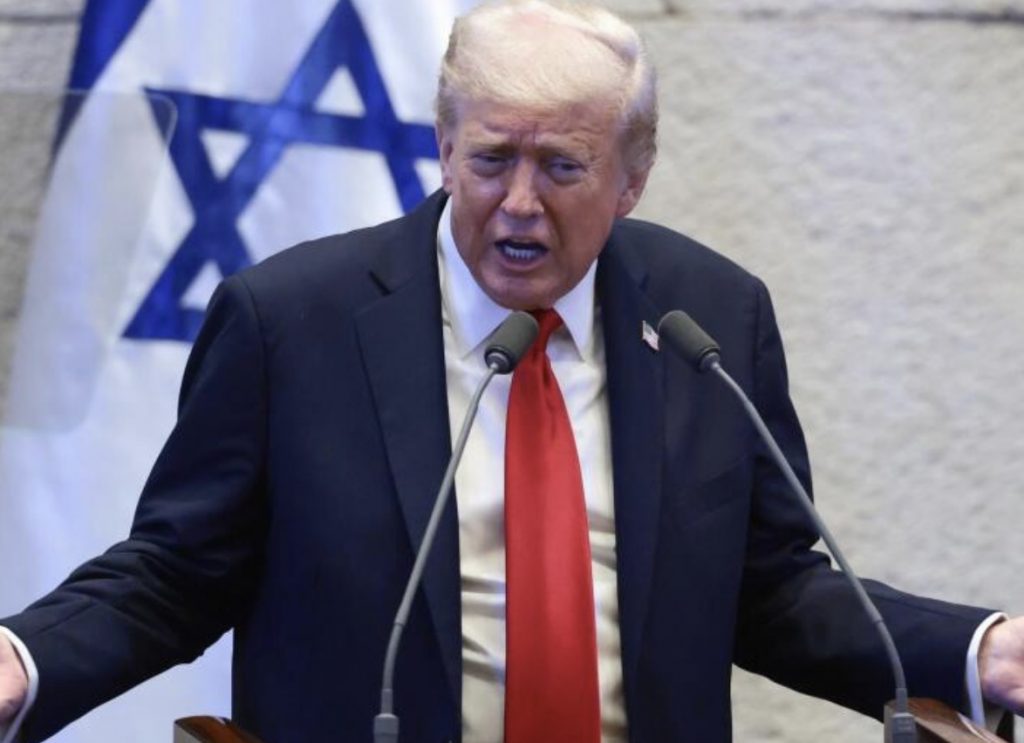JERUSALEM / ANKARA / WASHINGTON
President Donald Trump used a rare address to Israel’s Knesset on Monday to celebrate a cease-fire that saw Hamas hand over the last living Israeli hostages as Israel began releasing nearly 2,000 Palestinian prisoners—an exchange described by Israeli officials as the most consequential since the war began two years ago. Trump flew into Israel after a regional stop in Egypt, presenting the swap as the keystone of a broader U.S.-backed plan to wind down the conflict and open a path to reconstruction in Gaza. Reuters+2Politico+2
The choreography was deliberate. Hamas released seven captives in a first tranche on Sunday, with the remaining 13 freed on Monday, as buses carried released Palestinian prisoners into Ramallah and Gaza under Israeli custody transfers. From the Knesset podium, Trump hailed the exchange and framed the cease-fire as “a dawn of a new Middle East,” even as security briefly removed lawmakers who interrupted the speech. Outside the chamber, aides pointed to a follow-on summit in Egypt meant to lock in next steps on aid corridors, security guarantees, and political arrangements for Gaza’s interim governance.
Behind the stagecraft sat months of shuttle mediation by the United States with Qatar and Egypt—and, increasingly, with Türkiye. Ankara publicly endorsed the cease-fire and pledged to support implementation, while privately leveraging long-standing channels with Hamas. Turkish officials say intelligence chief İbrahim Kalın was present during pivotal rounds and that President Recep Tayyip Erdoğan, after recent talks at the White House, relayed U.S. requests to press Hamas toward the deal. Washington and regional diplomats credit those back-channels with helping to time hostages-for-prisoners sequencing and secure assurances around cease-fire milestones.
Türkiye’s role reflects both proximity and pragmatism. Ankara maintains ties with Hamas figures and has repeatedly positioned itself as a conduit for de-escalation, even as it condemned early phases of the war and criticized Israeli operations in Gaza. In the final stretch, Turkish and Qatari interlocutors worked parallel lines—Doha on financing and leadership contacts; Ankara on organizational buy-in and security guarantees—while Egypt handled ground logistics at Rafah and broader border security. The result, negotiators say, was a package that paired hostage release and phased prisoner swaps with initial Israeli troop pullbacks and a surge of humanitarian aid.
American officials describe the U.S. hand as both catalytic and continuous. Trump’s team pressed for a burst of confidence-building steps that would be visible to Israeli and Palestinian publics—especially synchronized releases and a public address to the Knesset—while keeping later questions about Gaza’s governance, disarmament, and reconstruction on a separate, longer timeline. The White House also coordinated with Cairo on summit optics and with European leaders on aid commitments, betting that early wins could create the political space for more difficult compromises. Analysts caution, however, that Trump’s sweeping claims—he told Israeli lawmakers the war was “over”—outstrip realities on the ground, where militants retain weapons and the contours of postwar administration remain unsettled.

In Israel, the scene was emotionally charged. Families greeted freed hostages; politicians across most parties praised the exchange, even as security services warned that enforcing cease-fire terms and preventing rearmament will be hard. In Palestinian cities, the mass prisoner releases drew large crowds while rights groups noted the scale of wartime detentions. Humanitarian agencies say opening crossings for sustained aid deliveries is urgent, with Gaza’s infrastructure shattered and displacement still widespread.
For Türkiye and the United States, the moment carries strategic weight beyond the images. A working cease-fire reduces the risk of a wider regional spillover and creates a platform for Ankara and Washington—often at odds in recent years—to cooperate on an issue of shared urgency. Turkish diplomats emphasize that their endorsement of the agreement is tied to reviving a political track toward a two-state solution, while U.S. officials argue that a durable quiet, coupled with security assurances and economic support, can shift incentives away from renewed conflict. Whether that convergence holds will depend on what follows: verification that all living hostages and agreed remains are returned, credible steps on Palestinian governance in Gaza, and mechanisms to monitor and enforce demilitarization commitments. Ministry of Foreign Affairs of Türkiye+1
For now, the prisoner-hostage exchange has reset the political tempo. Trump’s Knesset appearance and the Egypt summit gave the cease-fire an unmistakable public imprimatur; Qatar, Egypt, and Türkiye supplied the leverage and logistics; and Israel and Hamas executed an exchange at a scale that would have been unthinkable months ago. The next phase—aid delivery at volume, border management, and a political framework for Gaza—will test whether the U.S.–Türkiye alignment seen this week can translate into lasting arrangements rather than a brief pause between rounds.
